Dental Implants Springfield
New Teeth for Life
Among dental professionals around the world, there is no debate—dental implants are by far the best tooth replacement option available today. They offer the next best thing to natural teeth when it comes to strength, aesthetics, and longevity, and now you can get dental implants in Springfield or Palmer with Dr. Gramse. If you don’t want to just replace your missing teeth, but feel like they were never gone in the first place, schedule an appointment with us today.
Why Choose Dr. Laura Gramse Family Dental Care for Dental Implants?
- Partnered with Local Dental Implant Experts
- Dentist That Prioritizes People Over Profit
- Trusted by Springfield & Palmer for Decades
What Are Dental Implants?

A dental implant is a prosthetic tooth root that is placed directly into the jawbone. It’s a small titanium post that resembles a screw, and once in position, it bonds directly with the bone just like a real tooth root. This makes it extremely stable, and it can be topped with a crown, bridge, or denture to bring back as many teeth as a patient needs.
The 4-Step Dental Implant Process

Dental implants are the top choice for replacing missing teeth. Since they replace the roots as well as the crowns, they generally offer advantages you just can’t get with traditional dentures or dental bridges. The process for dental implants happens in several stages over a few months. While every patient’s journey is a little different, here are the four main steps you can expect during the process.
Initial Dental Implant Consultation

Are dental implants a good choice for you? Let’s talk about it! Dr. Gramse will examine your mouth and go over your various replacement options so you can choose the one that best suits your needs and situation. We will also determine if your current oral health is in good condition and if you’re free of any issues that could risk failure later on. If necessary, we can help prepare your mouth for dental implants with treatments like gum disease or even a tooth extraction. Once your jaw and gums are ready, we can get you started with the next part of the process.
Dental Implant Surgery

If you agree to get dental implants, you’ll have the placement surgery performed by a local specialist who has worked with Dr. Gramse for years. Before starting your procedure, your team will typically numb your mouth so that you’re as comfortable as possible. They might even provide you with sedation dentistry to allow you to be relaxed during your appointment. Your dentist will then make a tiny incision in your gums so that they can place your implants into your jawbone before suturing the tissue closed. Afterward, you’ll have your trusted friend or family member take you home so that you can rest and recover.
Dental Implant Osseointegration & Abutment

While you’re healing, osseointegration will take place, which means your implants become firmly attached to your bone. This is what will allow your metal posts to function similarly to your natural tooth roots, providing stability and longevity for your restoration(s). After a few months, a small connector piece called an abutment will be placed on your implant(s), which will attach directly to your restoration(s).
Delivery of Dental Implant Restoration(s)

The big day has finally arrived! Once your gums have recovered from receiving your abutments, you’ll return to us, and Dr. Gramse will place your specially-made crown, bridge, or denture on your implant(s), completing the treatment. We’ll make any minor adjustments if necessary, and once we’ve confirmed that your bite is correct and you’re satisfied with the results, you’ll be free to make the most of your renewed smile.
Benefits of Dental Implants
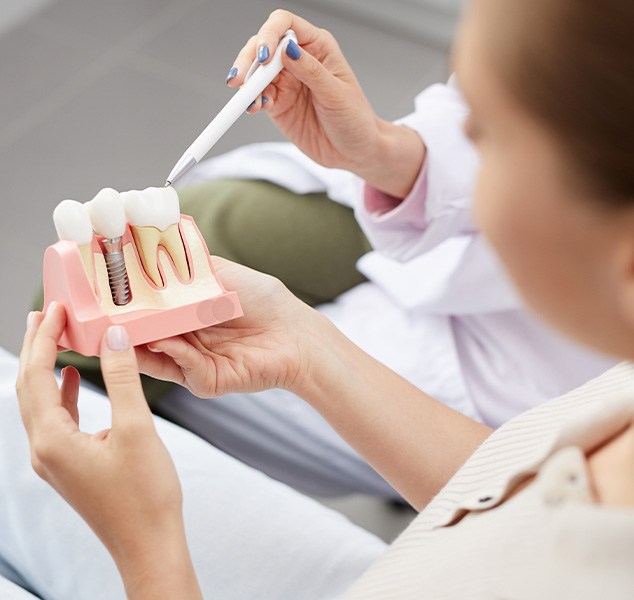
Dental implants continue to gain popularity with an estimated 500,000+ placed annually. Experts believe this number will continue to grow as more people learn about these unique restorations. They are the only ones that are embedded directly into your jawbone, so they offer additional benefits over alternatives like dentures or dental bridges.
Continue reading to learn more about the many benefits of dental implants, and feel free to contact us for additional information.
Day-to-Day Benefits

Tooth loss can detract from your daily quality of life because you need a full set to thoroughly chew food, enunciate words, and smile authentically. Fortunately, dental implants can help because they:
- Require Few Dietary Restrictions. Your jawbone fuses with the titanium pole of your implant, so it functions like a sturdy standalone structure. As a result, it returns 90% to 100% of your chewing power compared to 10% to 30% with other treatments so that you can enjoy all your favorite foods.
- Are Easy to Clean. Your restoration is a permanent part of your smile and maintaining it is as easy as brushing and flossing twice daily.
- Look Lifelike. The prosthetic placed over your dental implant is usually made from a resilient ceramic that can be customized to match the shade, shape, and size of your natural teeth for seamless results that boost your confidence.
Health Benefits

Not only do dental implants restore your smile’s appearance and functionality, but they can also boost your oral and overall well-being by:
- Strengthening Your Jawbone. After tooth loss, up to 25% of the surrounding jawbone density can be lost within the first year because there’s no root to stimulate new bone growth every time you bite down. The metal rod of your implant acts like a root to keep your jaw active and healthy enough to provide a firm foundation for your teeth.
- Prevent Oral Issues. It’s easier to thoroughly brush and floss dental implants than other restorations, increasing your mouth’s resistance to decay, disease, and injuries.
- Preserve Dental Alignment. When teeth fall out, the ones left behind are likely to shift out of alignment to try to fill in the gap. This can wear down your enamel unevenly, resulting in gaps, overcrowding, or cause a bite misalignment. Dental implants ensure everything remains where it should.
Long-Term Benefits
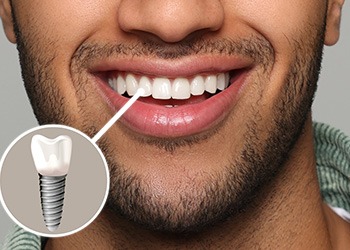
Your dental implants fuse with your jawbone to become a permanent part of your grin, which means you can enjoy many long-term advantages like:
- High Success Rate. These prosthetics are reported to have an incredibly high success rate of 95%, even up to 10 years after their initial placement.
- If cared for correctly, your new teeth could last 25+ years, or the remainder of your natural life.
- Save on Expenditures. They’re more firmly rooted in your mouth and won’t fall out mid-meal or conversation, so you won’t have to invest in frequent repairs or replacements like other replacements. Plus, you won’t have to purchase adhesives, soaking solutions, or other supplies that can add up over time.
Understanding the Cost of Dental Implants
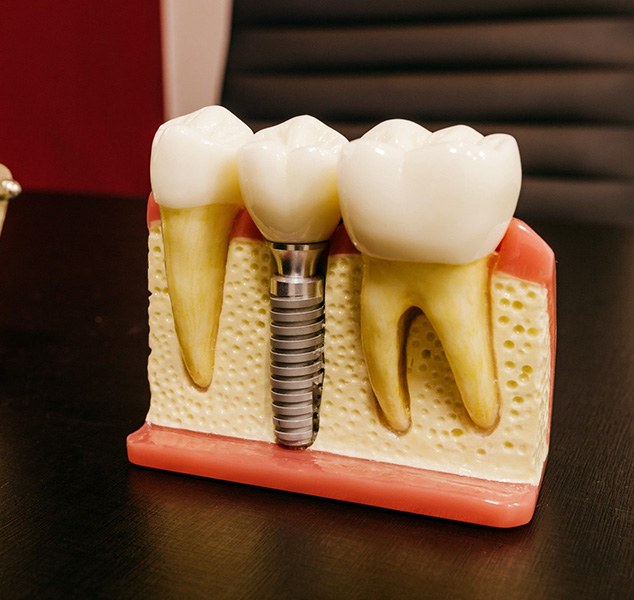
Many factors influence the cost of dental implants in Springfield, but they are more affordable than you might think. Your treatment will occur in several steps, each with different costs. This gives you more time to pay because you won't have to come up with a lump sum before you can get started. Not to mention, our office offers various financial options to keep dental implants within your budget. You won't have to compromise quality or aesthetics to keep dental implants affordable.
Preliminary Treatments & Dental Implant Surgery
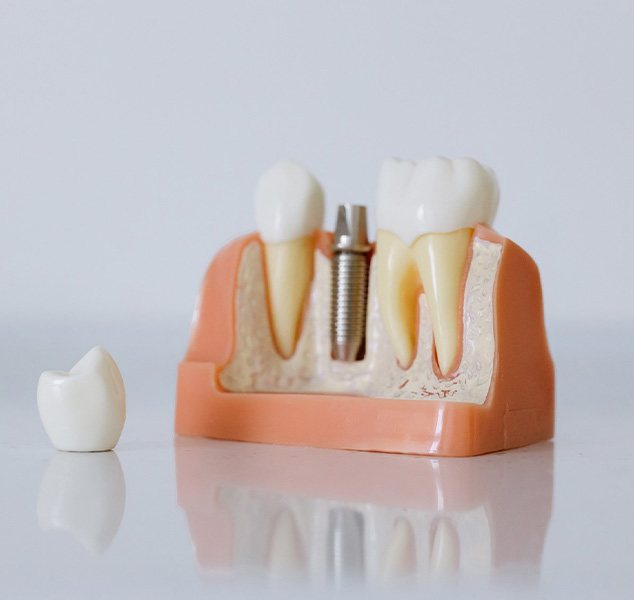
There's no flat fee for dental implants because every mouth and situation differs. You'll require an initial consultation with your implant dentist in Springfield. They'll examine your mouth to ensure dental implants are right for you. During their examination, they may find you require a little prep work before your placement surgery, like tooth extractions, gum disease treatment, or bone grafting. Besides your placement surgery, any preparatory procedures will be factored into your estimate.
The Parts of Your Dental Implant
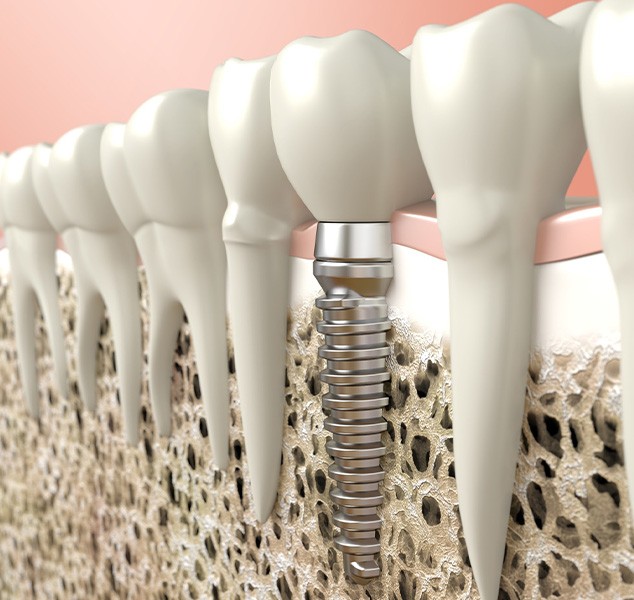
The amount you'll pay for dental implants is also affected by the number of teeth you are replacing. You'll need to pay for each component of the prosthetic tooth, which includes:
- Implant Post: A titanium implant post is placed into your jawbone to serve as a new tooth root.
- Abutment: An abutment is a special fixture that connects your restoration to your implant.
- Restoration: You will require either a crown, bridge, or denture.
How Dental Implants Can Save You Money

Dental implants in Springfield are the most cost-effective solution to replace missing teeth because they are proven to last for 30 years or more with the correct care, like brushing and flossing. You won't have to budget for replacements every few years, like with traditional bridges and dentures. In addition, dental implants also improve your oral health, so you're less likely to need costly procedures later. As the next best thing to a real tooth, a dental implant offers priceless benefits. You'll enjoy a solution that looks and feels natural.
Does My Dental Insurance Cover Dental Implants?

Your dental insurance probably won't cover the entire cost of dental implants, but your benefits can be used to reduce the amount you will pay out-of-pocket. Your insurance may cover your consultation and some of the expenses for preparatory procedures and medically necessary treatments after meeting your annual deductible. Your dentist will work on your behalf to maximize your coverage to keep dental implants affordable.
Making Dental Implants Affordable

A member of our dental team will discuss your estimate and payment options, so you'll know exactly what you'll have to pay before committing to anything. In addition to dental insurance, our office also accepts:
- Traditional Payments: We accept cash, personal checks, and most credit cards for your convenience.
- Financing: Based on your credit approval, you can make monthly payments for any out-of-pocket expenses using a third-party financing company, like CareCredit.
Maintaining & Caring for Your Dental Implants

Dental implants are the only replacement teeth that are surgically embedded into your jawbone, allowing them to become a more permanent part of your mouth that can restore your smile’s appearance and functionality long-term.
But that’s only as long as they’re cared for properly! Continue reading to learn more about how to maintain your restorations so you can continue enjoying their many unique advantages!
Make Oral Hygiene a Priority

Your new teeth are made from resilient, biocompatible materials that don’t develop tooth decay, so you don’t need to worry about them getting cavities. However, you must continue cleaning your mouth consistently to avoid decay or disease in your neighboring teeth, gums, or jawbone, which can negatively impact your implants.
Fortunately, brushing and flossing twice daily removes harmful plaque and bacteria and prevents many common oral concerns.
Eat a Healthy Diet

These restorations fuse with your jawbone to function as sturdy standalone structures in your mouth, which means they’re strong enough to withstand the force of daily chewing. They can potentially return up to 80% or more of your initial biting power so there are fewer dietary restrictions.
But consuming too many hard, crunchy, sticky, or sugary foods can still chip, crack, or otherwise damage them. Meanwhile, choosing foods like dairy products, which contain calcium to support strong teeth and bones, or citrus fruits, which are often high in vitamin C to promote gum health, can preserve your implants and prevent problems.
Break Bad Habits

If you regularly use tobacco products, like smoking vapes or cigarettes, you could be putting your implants at risk. They contain nicotine, which restricts your body’s blood oxygen levels and suppresses your immune system.
As a result, your mouth doesn’t benefit from your natural defense system, making infections like peri-implantitis, the leading cause of failure, much more likely. Quitting is a simple and effective way to help preserve your new teeth.
You should also try to avoid using them as tools to open packages or nervously nibble pen caps, finger nails, or other objects.
Protect Your Dental Implants

Athletes and others who participate in close-contact activities are more likely to sustain injuries that could break or dislodge their dental implant. Not only that, but if you grind your teeth at night, the added pressure of constantly clenching might hurt it.
Dr. Gramse and the rest of our team in Springfield can provide a custom-fitted nightguard or mouthguard to shield your teeth and implants from sustaining potential injuries.
Schedule Regular Dental Checkups

Visiting our team for routine exams and cleanings allows us to monitor your oral condition so we can catch and treat any areas of concern before they worsen. For instance, we have the experience and state-of-the-art technology to identify early signs of gum disease to halt its progression before it can negatively impact your restoration.
Dental Implant FAQs
How long do dental implants last?
Because dental implants in Palmer are a relatively modern procedure, there aren’t many studies out there that have been going on for long enough to capture their true lifespan. However, many of the existing studies show that with good oral hygiene and healthy habits, it’s possible that they can last for 25 or more years.
To get the most out of your dental implants, routine checkups and cleanings with Dr. Gramse, as well as daily brushing and flossing at home are critical.
How successful are dental implants?
Dental implants have been shown to have a success rate of 95 percent after 10 years of placement, which means that 95 percent of patients who receive dental implants will still have them 10 years later.
In some cases, there are outside factors and habits that can increase your risk of dental implant failure, like smoking, poor oral hygiene habits, and underlying, untreated medical conditions. However, Dr. Gramse and our team will be able to assess your risk of implant failure at your initial consultation to help determine if you’re a good candidate for the procedure.
What causes dental implant failure?
One of the top causes of dental implant failure is peri-implantitis, which is an infection that affects the supportive soft and hard tissues around the dental implant. As it worsens, it can cause the implant to eventually become loose or even fail, and this is often the result of poor oral hygiene.
Another cause of dental implant failure is when the implants don’t integrate with the jawbone. This can result from teeth grinding, tobacco use, certain underlying medical conditions, etc., and Dr. Gramse will screen patients for these risks during the initial consultation.
Can I get dental implants if I smoke?
Smoking can put you at a greater risk of osseointegration failure, meaning your dental implants wouldn’t properly fuse with your jawbone. However, just because you smoke doesn’t mean you can’t get dental implants. We ask that you quit smoking at least two weeks before your dental implant surgery and three to six months following your procedure to give your implants the best chance at success.
Will people be able to tell that I have dental implants?
Dental implants have a natural look and feel, making them virtually impossible to distinguish from your natural teeth. Additionally, the prosthetics themselves are sleeker than traditional dentures, making it easier for you to speak clearly and chew a wider variety of foods.



